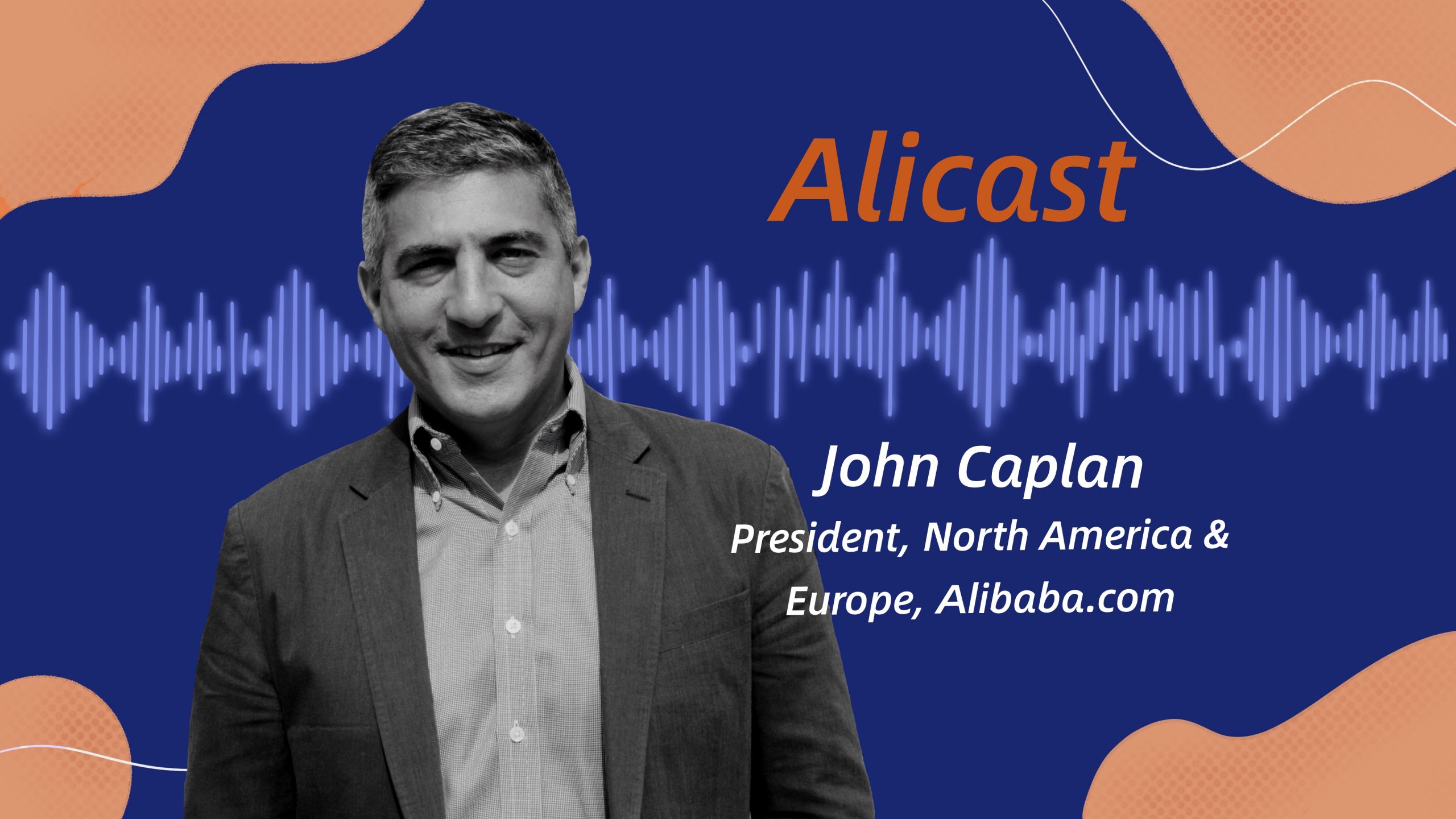
Click on the “play” button below to listen to the podcast.
Spearheading the transformation has been John Caplan. He’s president of Alibaba.com for North America and Europe. He joined us recently on Alicast. Below is a transcript of that conversation, edited for length and clarity.
I’ve gotta ask you this. You’ve become a very public voice and face and evangelizer for Alibaba.com. In entrepreneurial circles, people know who you are. For those who don’t, can you talk about who John Caplan is and what got you here?
Well, I think the, the most important part of my experience at Alibaba.com is helping to transform our business from being a yellow pages platform or directory of the high-quality factories in China into being a global platform that enables buyers and sellers around the world to connect with one another, create contracts with one another and do trade, right? We’ve gone from being a yellow page business to an end-to-end B2B platform. The reason why that’s so important that Alibaba group is our mission is to enable the world small businesses to do business anywhere.
And Alibaba.com is that operating system for global trade. You know, I am a lifelong entrepreneur. If you scratch me, I think I bleed small business. Everything about helping the creativity, spirited resilience of people who want to make a better lives for themselves is what small business is all about. And so our team is building this transformation culture of taking this incredible asset, Alibaba.com, and evolving it from a yellow pages directory to an end-to-end platform with services for buyers and sellers from supply, primarily in China, to now global supply. The U.S. and Europe are the fastest-growing supply markets on Alibaba.com and building a culture of get it done.
Customer-first business builders that operate in the West, in Europe, in South America and in Asia, across time zones, across cultures, frankly, across backgrounds, to create a new global B2B trade experience that makes it easy for small businesses globally to do that. And it feels like everything I’ve been doing in my life has, has prepared me for this incredible journey as a member of the Alibaba team
About tools and services. What are those tools and services and, and how are SMEs in the United States, for example, tapping?
The services we’ve offered are really important, right? The first and most basic is payment. Right now, a buyer and seller can find each other, chat with one another, and payment can happen in the platform in a secure way with a product we’ve created called Trade Assurance, which is essentially cross-border escrow so that a buyer can feel confident.
So, a small business in the West is able to have benefit of their capital in their own bank account, as opposed to prepaying for their supply. We’ve launched freight and air shipment services to enable an integrated service so that, as you procure the goods you need, you also can buy the logistics at the best rate you need. The essence of the Alibaba.com platform is an end-to-end, simple-to-use, trusted environment for buyers and sellers to connect with one another and trade. And what’s so incredible about that, and certainly what COVID has supercharged our business in some ways, is that you don’t have to leave your desk to now do business any place around the globe. It’s a two-decade shift and acceleration and the transformation of the global B2B economy, and our team is working tirelessly to help small businesses capture the opportunities globally that the digital economy represents for them.
Could you talk about how Alibaba.com weathered the pandemic and what efforts or measures you put in place during the outbreak?
A crazy, sad and strange year, I think, for the planet. And so, like every business, our priority has been the health and safety of our team and our employees, and we moved to remote workforce and we’re still remote today. Well, I spent 130 days in Asia last year and you know, I haven’t left my living room this year. I am eager to return to our office and get out and see our customers as soon as it’s safe to do so. But right now, we are focused on the guidelines put in place by local government and health officials. So at the height of the pandemic, we realized we could help frontline medical professionals source needed PPE. Alibaba.com launched what we call a “pavilion,†think of it as a curated assortment of the best PPE and diagnostic equipment available from trusted manufacturers, and got it, and sort of made it simple for buyers globally to get their hands on the high-quality goods.
That’s number one. Next, what we did is we spent a tremendous amount of energy getting close to our small business customers. And, you know, here in the United States, U.S. SMBs (small and medium-sized businesses) are rapidly going digital, and they increasingly recognize the importance of going global, selling globally and sourcing globally. And we’ve seen a 70% increase in buyers from the United States, joining Alibaba.com in the last year. And we’ve seen transactions involving U.S. businesses up over 120% year on year. I think that’s really big. And the data is largely the same in Europe as well. I think the reason for that is what I referred to. We’ve tried to make it simple to your laptop, but still get the benefit of global trade. And in response to the pandemic, we are committed to providing small businesses with the insights, inspiration, trusted environment.
They need to navigate the challenges. So we’ve partly helped via content. You know, we’ve launched a daily often, frankly, multiple times a day content series. We call it “B2B Today,†which is content that spans the gamut, whether it’s how to apply for a PPP loan or something else. You know, at the beginning of the pandemic content about featuring the pivot stories of U.S. SMBs, who have, you know, we’re in one business, and now, we’re an entirely different business today because of the pandemic. Everything we’re doing is trying to help global small businesses and here in the U.S., U.S. small businesses not only highlight their contribution to the U.S. economy, which is substantial, but help them capture the $23.9 trillion B2B e-commerce opportunity. In June, we launched our Alibaba.com freight solution to enable American SMBs to secure ocean and air shipping.
We launched Alibaba.com payment terms to provide cash flow control, and something that has been a really material impact to our business is the Alibaba.com online trade show initiative. And what we’re doing with our online trade shows, we have trade shows in the U.S. to connect U.S. manufacturers and global manufacturers and wholesalers with business buyers from around the globe.
And the reason why that’s so important is we’ve all experienced the intimacy and connection of the, what I’ll call the “Zoom economy,†right? Us all being on video together and talking. And so, in the old world, the analogue trade show, you had to fly someplace and stay in a hotel and walk the floor and hope to meet someone in the Alibaba.com trade show world. Now, you turn on your video and you’re introduced to specific manufacturers who have innovations relevant to your needs. They’re in their place of business. So you can see there how they work and who they are. You aren’t interrupted by the noise of the show or the distractions of the event. And you save the cost and time of travel. And those trade online trade shows have been, I think, an innovation that is here to stay. Sort of a silver lining of the pandemic is that the trade show world has gone digital, and Alibaba.com is leading the way.
There’s a lot to unpack from what you just said. And I’d like to get back to the virtual trade fairs in a second, but you said something interesting. It’s not just a case in your mind of building it and they will come. What is it about content that makes the platform more accessible? And when you put content out there, when you inform people, are you trying to build a community?
I’m glad you asked this question, and we can dig deeper into the relevance and importance of content. I think our obligation, our responsibility to our community, is to be an ally to small businesses, you know, to provide not just a tool and a technical platform and an environment that that is trusted, which it is, and not just to provide the certainty of delivery of the goods or the flow of funds, which it does, but actually to make it possible for business owners of every type in every country of background, to learn, to share, to develop insight into an inspiration, and it can come from multiple places. You know, we have daily webinars with experts from the logistics industry, the payments industry, the customs industry. We have HR professionals.
What we really think is that small businesses are, often despite being 50% of the economy here in United States, small businesses often have, or are treated as if they’ll figure it out on their own. And, you know, our view is to put our, the full muscle of our organization behind helping them learn and, and find nuggets of insight that can make their journey simpler and easier and more effective. And so, our team is committed to doing that. And I think whether it’s the 20 million people who follow us on Facebook or the millions in our database, what we try to do is publish lots of insights so that the community can learn and grow together.
Just one last thing on content, could you talk a little bit about the “Transformer Talks†feature you do, because I’m a fan, and that’s an interesting concept. I’d like to get a sense from you. Where did the idea come from and what do you do?
We have this incredible team. And so Erica and Kate and the content folks in our New York office, we’re developing daily insights for our audiences. And I, frankly, went to the team and asked, could I host a, a weekly series where I interview a business leader, an entrepreneur or a luminary and just hear them talk about how they were personally dealing with the transformation to their lives and their businesses as a result of the pandemic. And we’ve had Tom Colicchio, the celebrity chef and founder of Crafted Hospitality. And we had a deep and interesting conversation about social justice with him. We had the remarkable and powerful female leader, Soraya Darabi, who’s the founder of Trail Mix Ventures talk about sexism and in venture capital and Stephanie Leblanc Godfrey, the global head of inclusion for women of color at Google, discussing the Black Lives Matter movement and what it meant, and the transformation in corporate America, as a result of it.
In addition to folks like Ben Kaufman, the founder of Camp, talking about retail and the transformation of retail. Certainly, my personal experience has been entrepreneurs around the globe are more similar than we are different. We all want to feed our families and send our kids to college and build our communities ,and pulling together the insights of these transformers and hear them talk in an unfiltered unscripted down-to-earth and real way about what it’s like, the transformation they’ve gone through. I think that has tried to add to the conversation that folks are having around the world about how this is a moment of great change, and it will, I think, usher in the age of small business. But we’ve got to get through some tough times before we do that. And we’re trying to do everything we can to help folks navigate, to get there.
Can we walk backwards a little bit to the virtual trade fairs? Everything you’ve said makes sense to me about the education, the content-building the community, what you do when you can’t travel 130, 30 days a year, or spend 130 days a year in Asia. Here’s where we are right now. And here, here are the things that we do to help overcome that. And then you mentioned, you also found silver linings, and some of these things will last. Sometimes it’s faster and easier, though, to seal the deal with looking in the guy’s eyes or shaking the lady’s hand and consummating a deal. So I’m wondering how far out does the virtual trade fair work?
I want to make something sort of super clear. I hope we’re not in a world where we don’t ever meet one another face-to-face. Again, there is a connection that is, I think, critical about face-to-face engagement. The truth is, though, it’s the luxury of the affluent. Most small businesspeople can’t get on the plane and fly around the world to meet suppliers or attend every trade show that they would like. And the democratization of access is what the digital platforms enable. The online trade shows are a really powerful tool for all small businesses and global businesses to connect with one another.
I don’t think it replaces the face-to-face engagement. I think it makes it more possible for more businesses to thrive. You know, according to our research and Alibaba trade shows have historically been the most important way for sellers to meet and acquire new customers and for business buyers to use it, to explore new products and find new suppliers, right? That is never going to change.
But then there’s the launch of our global online trade show initiative. We’ve had, or we will have, 20 digital trade shows in 120 days to bring the world’s SMBs together and virtual show floors, right? So you have somebody from South America, someone from the U.S., someone from Europe and someone from Asia, all connecting in a way that they previously would not be able to do. And in our online events, you can expect much of what is the same, just from the benefit of your couch, right? You see insightful keynotes, passionate exhibitors, trying to convince you of their capability, the ability for one-on-one time to begin to connect a buyer and seller in a more intimate way, and then networking events for people to connect with the community of folks who trade in their industry. I think that is a really important thing about the trade show experience – the cocktail party – and that feeling of connection that happens. We had, in early July, a supplements and nutrition trade show that had 50 different us exhibitors and thousands of registered attendees and more than 50,000 viewers each day to the event that was a couple hours long.
We then hosted a trade show on August 18th for food and beverage, where we partnered with Square and a few other folks to feature brands like RX Bar and Mama O’s. And we had thousands of registered attendees and business buyers from companies like Target, Cisco, 7-Eleven, Impossible Foods, Kroger Kellogg’s and more, plus thousands of folks from companies that you haven’t heard of. And if you’re a SMB entrepreneur fighting the good fight to build your business, this was a way for you to reach an audience. You otherwise couldn’t do that. And the true feedback has been terrific. You know, I was chatting with a healthy cookie brand, JJ, and he said that, and I’m paraphrasing, 90% of the battle he faces is finding the right person to talk to when you go to a trade show, right? There’s a couple thousand people, but you don’t know, are you, are you talking to the person who has influence or you’re just talking to someone who is friendly but can’t help you grow your company.
And our event helped him because we had what we described as sort of matchmaking service get to the right people quickly. There’s a brand called angry supplements, but lovely people they’re not angry. And Diego, the CEO said, ‘Hey, look, this just saved me so much time!’ It kept him making connections, rather than walking and traveling, so it turned into more quality, leads, more quality interactions for him. And that’s what I think is really important, which is democratizing the access. So more small businesses can benefit, and this makes it possible for more of the world to make valuable connections. That’s why I think the online trade show is here to stay. And we had Alibaba.com plan to sort of put our foot on the gas on this. Because we think it’s really important for our customer.
You talked about the feedback being very good. Now, these were born out of necessity. We had a crisis situation, lockdowns, et cetera. And conceptually, I get exactly what you’re saying, but I’m also thinking about the 20 events in 120 days, which is highly ambitious. I really want to know, since you don’t have an army of 5,000 people carrying these things out for you, how do you go from concept to execution?
You’re right. We do not have a large team, but we have the best team. And I think they feel the responsibility of, and the obligation, to do the right thing for our customers. And so, when our customers couldn’t do business the way they used to, we felt like, and we believed it’s our responsibility to do everything we can. I think there’s a few things we’ve learned, which made us more effective. The more matching there is between attendees with buyers or buyers or sellers, the better the experience, right? So, the more upfront screening we’re doing a profile-building of buyers who are coming, it actually makes it easier for our seller.
I don’t think a seller needs to meet a hundred qualified buyers to think an event is a success. I think they’d be thrilled after three day online trade show spending a couple hours. If they came away with a couple of quality leads that were actionable for them. And so, I think volume is less important than quality. Another area I think is that the ability to go live into someone’s physical space is, you know, the trade show booth is the essence of artifice, right? Like you hire someone to design something to sort of attract people. When you’re live into someone’s desk, in their office or living room or factory floor, there’s no pretending you can see with your eyes. Is it clean? What’s the poster on the wall, all of that. And I think the authenticity of the connection in B2B trade is a real, is a big innovation. We’ve seen it in some of the Alibaba group, sister companies with live streamers selling to consumers, how powerful that can be. And I think we’re starting to see this, the early seeds of that kind of connection happen, where trust is built online in a live environment in a way that 2D maybe just can’t do.
I know you mentioned sellers just now and giving them quality leads. I know you guys have instituted a sellers program. Could you talk about what it is.
The transformation of Alibaba.com began a couple of years ago. And when we went from a yellow pages directory to an end-to-end transaction platform with services for buyers and sellers, that was transformation. Number-one transformation. Number two was we went from customized goods, the customization of supply that’s well underway. And the third big transformation was our focus on launching global supply – Europe, the U.S., Vietnam, Taiwan. You know, really just globalizing the supply and the platform. So in July of 2019, we announced that we had opened the platform in an enhanced way for U.S. sellers, SMBs, to join the multi-trillion dollar B2B e-commerce opportunity to sell to the world. And as I mentioned at the top of this conversation, the U.S. has been the fastest-growing market with new supply added in to the platform of manufacturers, wholesalers, distributors, growers, B2B brands. They’ve been using Alibaba to digitize their businesses with an online storefront, marketing and CRM tools to gain access to the millions of daily business buyers from around the world on our platform and the ecosystem of services, which we’ve been chatting about.
What we’ve seen in the early days of this program is companies like LTA international in Florida, which is an entrepreneurial Florida based export management company that sells consumer packaged goods to businesses. And they’ve done well north of a million dollars in sales in their first year. And they’ve increased their sales by 350% for some key products, with a 20% conversion rate for new customers in the first year. And what’s unique about Alibaba.com is they keep their margin when they sell on our platform, right? We don’t take a commission on every one of their orders. LTA paid us a membership fee of a couple thousand dollars to join the platform. And every dollar they sell, they keep. And that’s unlike some of the, I would say retailers, who claim their marketplaces compete with us.
Or there’s Karmic Seed, which is a business that creates sustainable products made from agricultural waste. And in the less than a year, over 60% of their total company sales come from the Alibaba.com platform globally, or Totally Products, another Florida-based company, a supplements business that has weathered the pandemic, I think, miraculously. And what the founder will tell you is that he’s expanding his business. We’re 35% of his sales coming from international buyers, pre joining Alibaba.com.
Some 99% of their business was here. It was domestic in the U.S., and I think that’s a really important part of the value proposition of getting digital with Alibaba.com or going global with Alibaba.com is that you can reach the world and you don’t need to be a thousand-person company with heads, with offices around the globe. You can be a 10-person business based in Detroit, or based in Florida, or based in Texas, and sell to the globe on Alibaba.com. And that is a really important way for business, small businesses to participate in the global economy and pivot to digital as they sort of navigate coming out of the pandemic.
Sign up for our newsletter to receive the latest Alibaba updates in your inbox every week.




